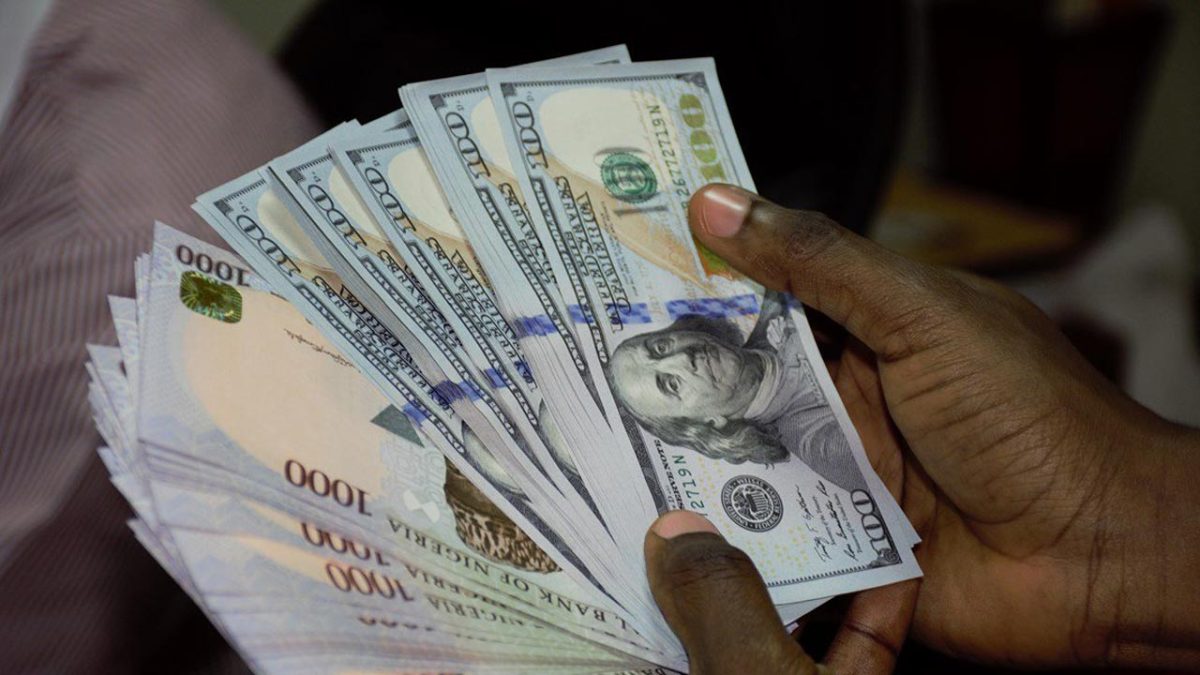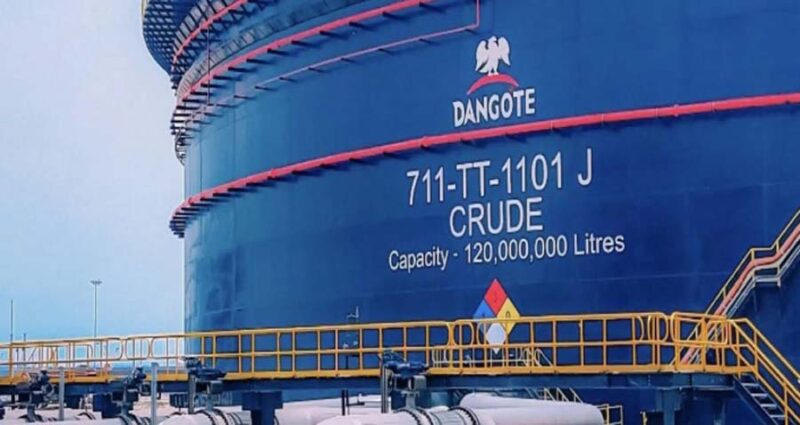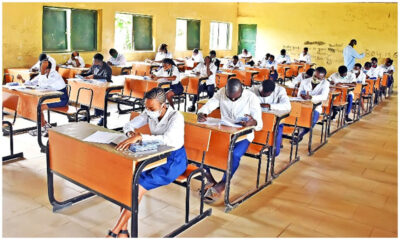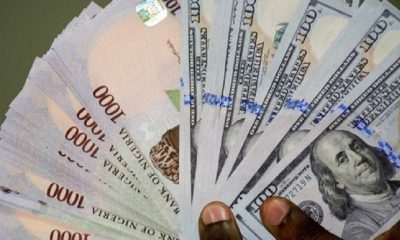“As an advocacy group for fair and just treatment, MURIC should have verified the facts before making statements that are entirely flawed and has the potential to incite ordinary Nigerians against the NNPC Ltd.”
Business
Forex interventions give false hope on naira, says IMF

REGULAR foreign exchange (forex) interventions in Nigeria and other emerging economies create false sense of security and hope on the local currency, the International Monetary Fund (IMF), has warned.
Nigeria, which operates a flexible exchange rate regime, spends about $16 billion annually to defend the naira.
A large part of the forex interventions are auctions at the inter-bank spot, sale of dollar for invisibles; Small and Medium Enterprises (SMEs); Bureaux De Change (BDC); Investors and Exporters (I&E) Forex window and Forwards.
In a joint report released at the weekend by IMF Director, Monetary and Capital Markets Department, Tobias Adrian; Director of the Fund’s Research Department; Gita Gopinath and Director of the Strategy, Policy and Review Department Ceyla Pazarbasioglu, the trio said that while flexible exchange rates can act as a useful shock absorber in the face of capital flow volatility, they do not always offer sufficient insulation.
They said the impact of the interventions is worse when access to global capital markets is interrupted or market depth is limited.
The report quoted Fund as saying “Persistent interventions might feed a (false) sense of security about future exchange rate developments that leads firms or households to take on more foreign currency debt, thus increasing balance sheet vulnerabilities.”
The IMF team said that in a continuous effort to help countries manage volatile cross-border capital flows, it has taken a major step toward a new analytical macroeconomic framework that can guide appropriate policy responses.
IMF analysis suggests that there is no “one-size-fits-all” response to capital flow volatility, nor is it a case of “anything goes” or that all policies are equally effective.
“Optimal policies depend on the nature of shocks and country characteristics. For instance, the appropriate policy response in a country with less developed financial markets and large foreign currency debts may differ from that of a country that does not have foreign currency mismatches on their balance sheets, or those that can rely on more sophisticated (deep and liquid) markets.”
“Generally, in countries with flexible exchange rates, deep markets, and continuous market access, full exchange rate adjustment to shocks remains appropriate.
“However, when a country has certain vulnerabilities, such as shallow markets, dollarization, or poorly anchored inflation expectations, while flexible exchange rates continue to provide significant benefits, other tools can play a useful role as well.
“In particular, macro-prudential measures, foreign exchange intervention, and capital flow management measures can enhance monetary policy autonomy so monetary policy can adequately focus on containing inflation and promoting stable economic growth. The same tools—including precautionary capital flow management measures on capital inflows, applied before shocks hit—can also help lower financial stability risks.”
For them, the work reflects evolving thinking on macroeconomic policy and will feed into the upcoming review of the IMF’s Institutional View on the Liberalization and Management of Capital Flows, which currently guides the Fund’s advice and assessments of members’ policies.
According to the Fund, international capital flows provide significant benefits for economic development but can also generate or amplify shocks. This dilemma has long posed challenges for policymakers in many open economies.
It said that many policymakers reach for a mix of policy tools to complement interest rate policy when dealing with capital flows. These tools include macro-prudential measures, foreign exchange intervention, and capital flow management measures.
Such diverse approaches were also used during the COVID-19 crisis, with significant differences in responses between countries. However, despite the widespread use of the various tools, to date, there has been no clear conceptual framework to guide the integrated usage of these tools.
The new framework represents a significant advance in thinking about when various tools should and should not be used and how these tools can work together to achieve better outcomes.
-The Nation
Business
Dangote Refinery can sell petrol to any marketer – NNPC

Dangote Refinery can sell petrol to any marketer – NNPC
The Nigerian National Petroleum Company Limited (NNPC Ltd) has said it has no desire or intention to be the sole offtaker of petrol produced by the Dangote Refinery Limited, DRL.
NNPC Ltd said this while reacting to claim by the Muslim Rights Concern, MURIC, which claims that the Dangote Refinery Limited (DRL) is being undermined by actions of the NNPC Ltd.
MURIC had in a statement issued on Friday claimed that recent changes to the pump price of petrol will prevent the Dangote Refinery from selling the product at lower prices to Nigerians.
The group also claimed NNPC Ltd. has become the sole offtaker of all products from the refinery.
However, Olufemi Soneye, Chief Corporate Communications Officer, NNPC Ltd in a statement on Saturday dismissed the claims of MURIC.
While puncturing the claims of MURIC, NNPC LTD in the statement noted that the pricing of petroleum products from any refinery, including the Dangote Refinery Ltd. (DRL), is determined by global market forces.
READ ALSO:
- Fuel crisis: Edo govt suspends school resumption
- Tinubu’s aide Ajuri Ngelale proceeds on indefinite leave over family health
- Kaduna LP rejects Nenadi Usman as Party’s national chair
The company thefore noted that recent changes in PMS prices have no impact on the DRL or any other domestic refinery’s access to the Nigerian market.
Business
Forex: CBN sells $20,000 to each BDC at N1,580/$

Forex: CBN sells $20,000 to each BDC at N1,580/$
The Central Bank of Nigeria (CBN) has announced plans to inject more liquidity into the foreign exchange market by approving the sale of US$20,000 to each eligible Bureau De Change (BDC) operator.
This move is aimed at meeting the growing demand for foreign exchange in the retail market, particularly for invisible transactions.
In a circular issued on September 6, 2024, and signed by Dr. W.J. Kanya, Acting Director of the CBN’s Trade and Exchange Department, the bank stated that eligible BDC operators would purchase the foreign currency at the rate of N1,580 per US dollar.
READ ALSO:
- My husband drugged me for others to rape me – Woman
- WHO dismisses report of link between smartphone use and brain cancer
- Trucks stranded at depots as petrol scarcity worsens
The BDCs are permitted to sell the forex to end-users at a margin not exceeding 1% above the purchase rate.
To facilitate the process, the bank said eligible BDCs must make Naira payments into designated CBN deposit accounts and submit the required documentation at the appropriate CBN branches in Abuja, Awka, Kano, and Lagos for the collection of the approved $20,000.
This measure is part of CBN’s ongoing efforts to stabilize the forex market and meet demand for invisible transactions such as payment for personal travel, medical bills, and school fees.
Forex: CBN sells $20,000 to each BDC at N1,580/$
Business
Naira falls by N34 to dollar in 24hrs

Naira falls by N34 to dollar in 24hrs
The Nigerian currency, Naira, has plummeted to an unprecedented low, trading at a staggering N1,639.41 per dollar at the official market on Thursday.
This marks a sharp decline from the previous day’s rate of N1,606, reflecting a dramatic loss of N34.
In a parallel trend, the black market also saw the naira fall, with the exchange rate reaching N1,645 per dollar, down from N1,640.
READ ALSO:
- WAEC, NECO not restricted to 18 years — FG
- Court issues contempt ruling against EFCC chairman
- APC rally turns chaotic in Edo, residents stone Oshiomhole, other party leaders
The worsening exchange rates signal deepening economic challenges and growing concerns over the stability of the national currency.
As the naira continues its downward spiral, analysts and market watchers are closely monitoring the situation, with implications for both the economy and daily lives of Nigerians.
Naira falls by N34 to dollar in 24hrs
-

 metro2 days ago
metro2 days agoFUNAAB student Christiana Idowu murdered after abduction by colleague in Lagos
-

 metro2 days ago
metro2 days agoKiller of Ogun agric varsity student arrested in Lagos
-

 Business2 days ago
Business2 days agoNNPC supplies 30m barrels of crude to Dangote
-

 Politics2 days ago
Politics2 days agoThose trying to lure Peter Obi away from LP wasting their time – Senator Umeh
-

 metro3 days ago
metro3 days agoThree domestic workers murder Ondo popular CEO
-

 Education1 day ago
Education1 day agoWAEC, NECO not restricted to 18 years — FG
-

 Education1 day ago
Education1 day ago40 additional institutions get student loans (+FULL LIST)
-

 Opinion17 hours ago
Opinion17 hours agoMystery of Dangote Refinery in Nigerian oil politics – Farooq Kperogi












You must be logged in to post a comment Login